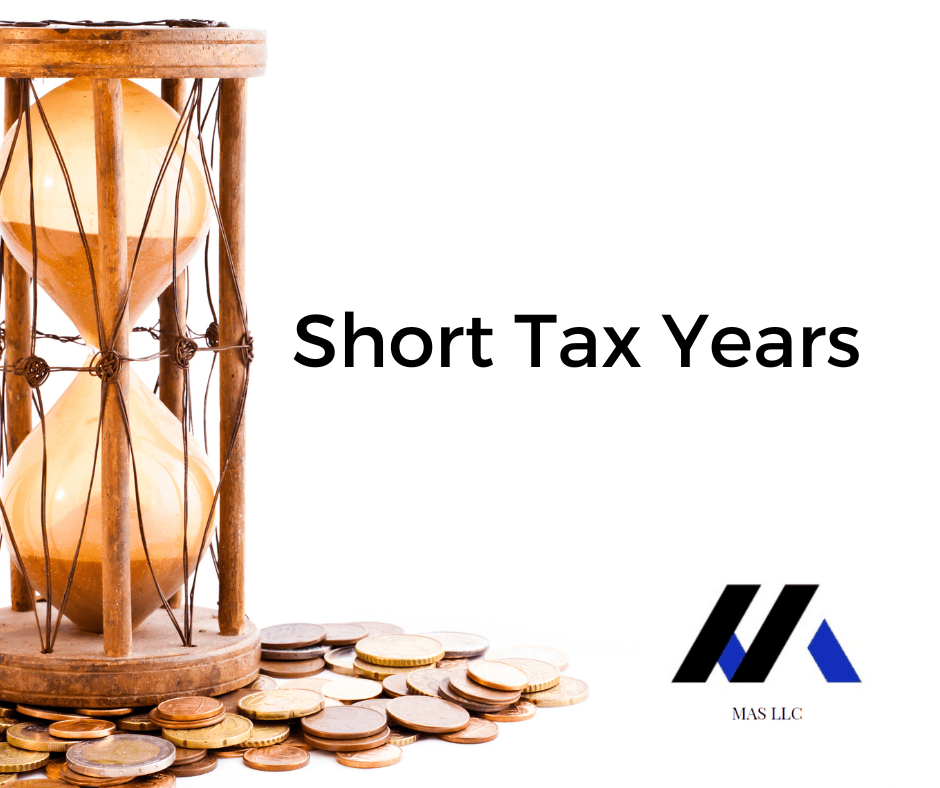A short tax year is a tax period that covers less than 12 months. This can happen for various reasons, such as when a business is established or terminated in the middle of a calendar year, when a taxpayer changes their accounting period, or when there are other circumstances that result in a tax period shorter than a full year.
For example, if a business is formed on July 1st and the standard tax year runs from January 1st to December 31st, the business would have a short tax year for the first year, covering only July 1st to December 31st.
The tax filings required for a short tax year typically depend on the type of taxpayer and the specific circumstances. Here are some general guidelines:
- Individuals: If an individual experiences a short tax year due to death, change in accounting period, or any other reason, they may need to file a Form 1040 for the short tax year. Income and deductions for the partial year are prorated accordingly.
- Corporations: For a short tax year, corporations usually need to file a corporate income tax return using Form 1120 for C corporations or Form 1120S for S corporations. Income and deductions are also prorated.
- Partnerships: Partnerships typically file Form 1065 for the short tax year, reporting the income and expenses for the period that the partnership was in existence during the year.
- Estates and Trusts: Estates and trusts may have short tax years due to the death of the grantor or other circumstances. They would file Form 1041 for the estate or trust for the short period.
- Businesses: If a business entity is created or dissolved during the tax year, it may have a short tax year. In such cases, the appropriate business tax return (e.g., Form 1120 for corporations, Form 1065 for partnerships) should be filed for the short period.
What is the Return Due Date?
The due date for short tax year partnership returns (Form 1065) is generally the 15th day of the third month following the close of the tax year. However, if the short tax year is the result of a business being formed or terminated during the year, the due date may be different.
Here are some key points to consider regarding due dates for short tax year partnership returns:
- General Due Date: If the short tax year is due to reasons other than the formation or termination of the partnership, the due date is typically the 15th day of the third month after the end of the short tax year. For example, if a partnership’s short tax year ends on September 30, the due date for filing Form 1065 would be December 15.
- Formation or Termination: If the partnership was formed or terminated during the short tax year, the due date may vary. In such cases, it’s advisable to consult the specific IRS instructions for Form 1065 or seek guidance from a tax professional to determine the correct due date.
- Extensions: Partnerships can request an extension of time to file their tax return by filing IRS Form 7004. This can provide an additional six months to file the return, but it’s important to note that an extension of time to file does not extend the time to pay any taxes owed. The tax liability should still be estimated and paid by the original due date.
- Change in Accounting Period: If a partnership changes its accounting period, this can also impact the due date for filing the return. The IRS may require the partnership to file a short-year return and calculate the tax liability accordingly.
Due dates and rules related to short tax year partnership returns can be complex, and they may vary depending on the specific circumstances of the partnership. It is advisable to consult with a tax professional or refer to the latest IRS guidance and instructions for Form 1065 to ensure accurate compliance with the tax filing requirements.
Top of Form





